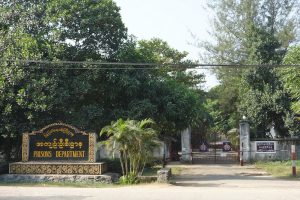Myanmar’s military junta released nearly 6,000 prisoners, including foreigners and political prisoners, to mark the country’s Independence Day on Saturday.
According to state-run television, Senior Gen. Min Aung Hlaing, the head of the military junta, granted amnesties covering 5,864 prisoners, including 180 foreigners, who will now be deported from the country. The military ordered the release “on humanitarian and compassionate grounds” and said that it would also commute the life sentences of 144 people to 15 years, the television report stated.
Some initial reports said that the foreigners could include the four Thai fishermen who were arrested by Myanmar’s navy in late November, after patrol boats opened fire on Thai fishing vessels operating in waters close to the two nations’ maritime border in the Andaman Sea. But the Thai Ministry of Foreign Affairs said that while 152 Thai nationals were among those foreign nationals released in Saturday’s amnesty, the four fishermen were not among them. It added that the Ministry would continue to work toward their release.
Zaw Min Tun, a spokesperson for the State Administration Council (SAC), as the junta is formally known, said that those released also included around 600 political prisoners.
“About 600 people prosecuted under 505 will be included,” he said on Saturday, according to Radio Free Asia. Section 505(a) of the penal code, which outlaws the spreading of false news and any comments that create public unrest or fear, has been used to target opponents of the military junta, which seized power in a coup in February 2021.
While it might be tempting to view the release as a concession on the part of the junta, prisoner releases have long taken place on important national and Buddhist holidays, as they are in Southeast Asia’s other Theravada Buddhist nations. Since the coup, the SAC has announced several such amnesties, including one in 2023 that involved mostly political prisoners and a 9,000-prisoner amnesty for last year’s Independence Day. Mass amnesties were also announced periodically by the military administrations that ruled the country for five decades to 2011.
As human rights activists have long emphasized, there are severe limits to these amnesties. Those freed effectively remain political hostages of the junta; prison sentences are not expunged but can be reactivated the moment the former prisoner commits another “offense.”
There have been several recent instances in which prisoners have been released only to be picked up later the same day and returned to custody under different charges. In April of last year, Dr. Hkalam Samson, a prominent Kachin Christian leader, was among the more than 3,000 prisoners released to mark the annual Thingyan New Year festival in April 2024. He was re-arrested later that day and imprisoned until his release in July.
As Ming Yu Hah of Amnesty International has previously put it, the threat of re-arrest “effectively places a chilling effect on many people wanting to exercise their basic rights and freedoms.” All of this militates against viewing the amnesty as a concession or sign of leniency on the part of the SAC, which remains by all accounts committed to holding onto power by whatever means necessary.
According to the Assistance Association for Political Prisoners, which is keeping a running count of those killed and detained by the junta, more than 28,000 people have been arrested since the coup, as of January 6. Of these, 21,452 are believed to remain in custody.

































